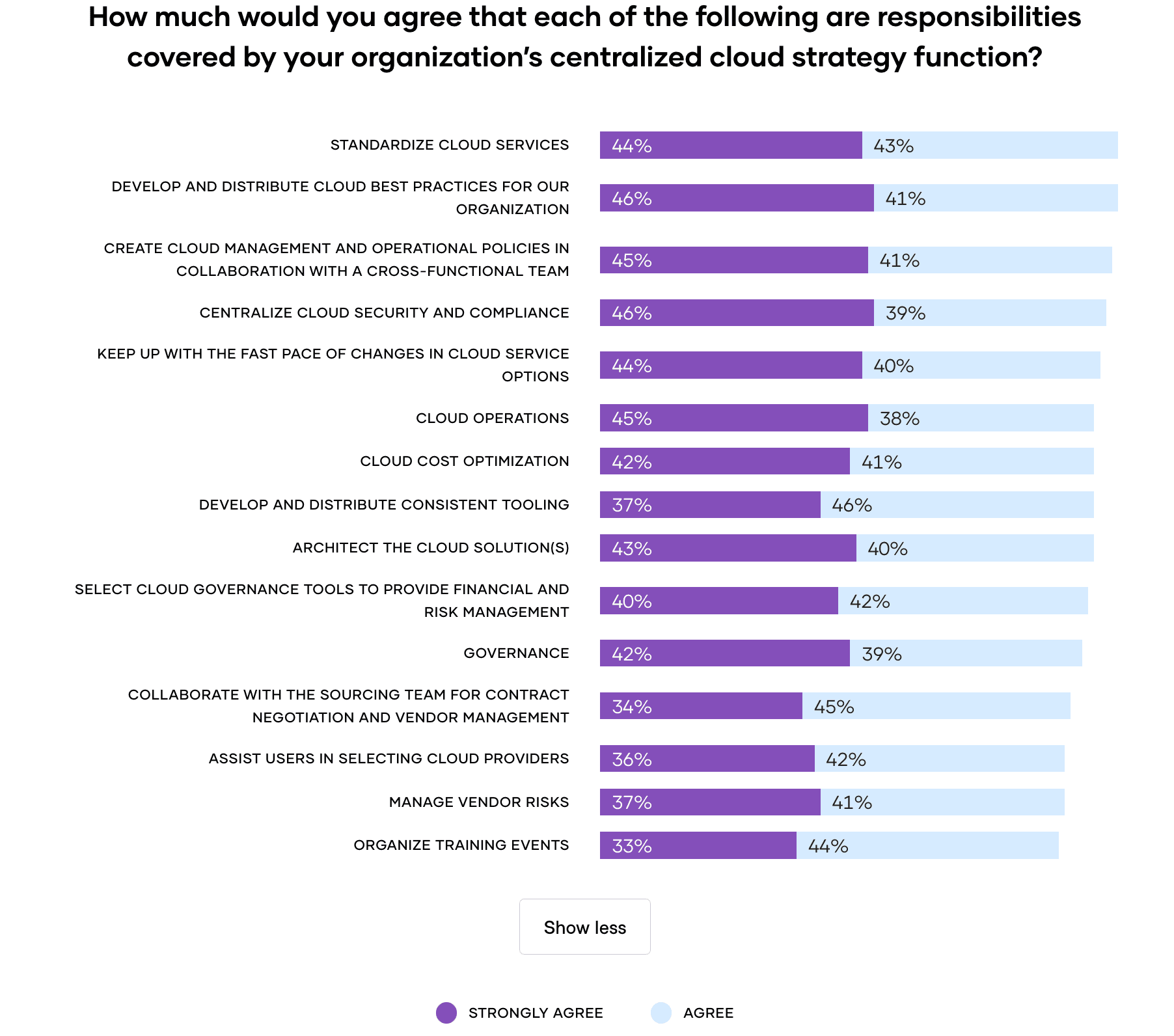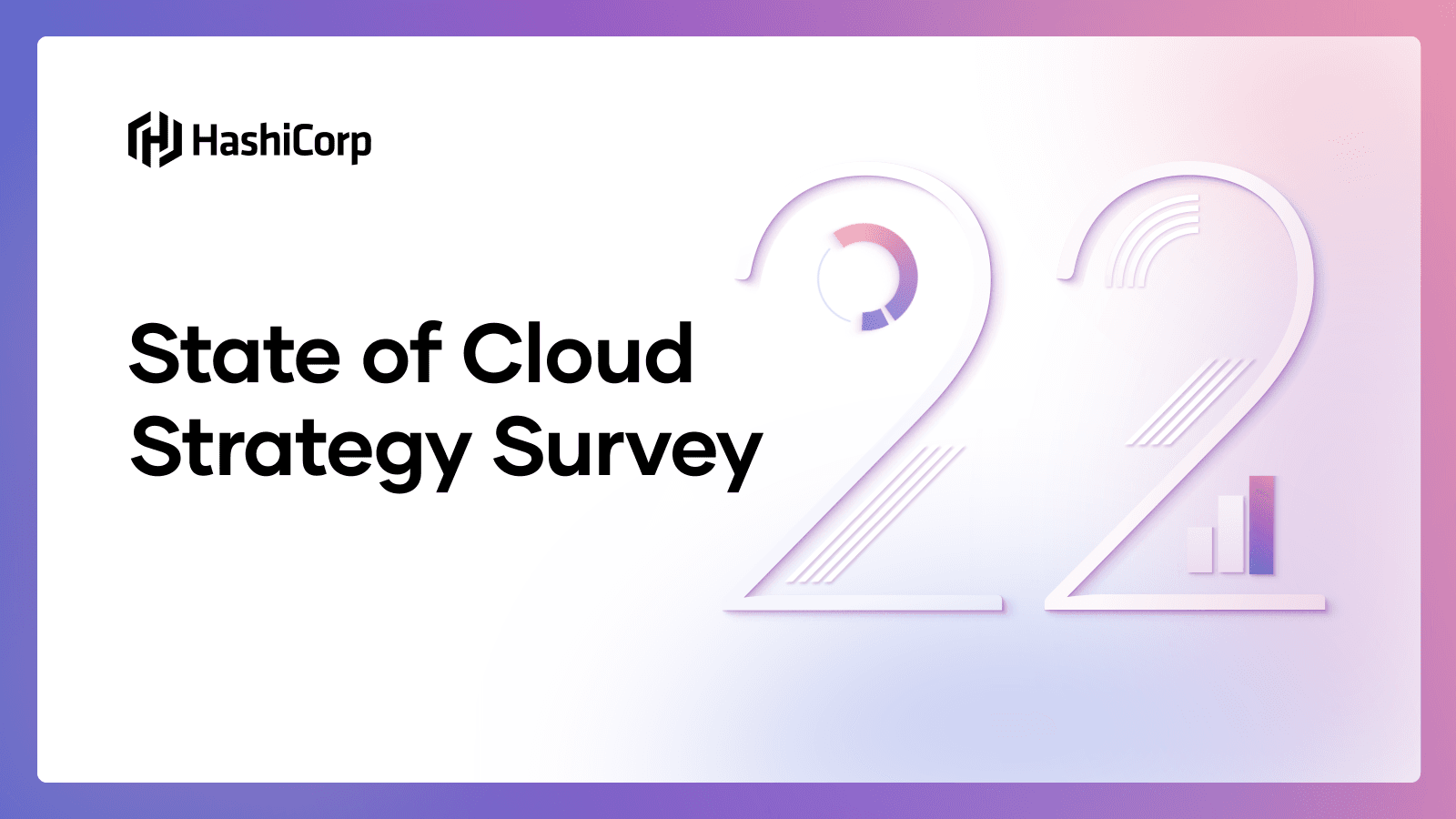Organizations with complex business requirements have long sought ways to simplify operations and boost the productivity of their software development teams. It appears business and IT leaders have found an answer: adopt and empower centralized cloud platform teams.
According to the second annual HashiCorp State of Cloud Strategy Survey (commissioned by HashiCorp and conducted by Forrester Consulting), 86% of respondents rely on a platform team for strategic and operational cloud responsibilities. (Note: for the survey, we defined a platform team as a “centralized function or group with responsibility for formally managing cloud operations or strategy.”)
In our experience working with many of the world’s largest brands, platform teams typically include engineers who provision, run, and manage cloud infrastructure and other shared services. These teams create and operate highly automated platforms available on-demand across the organization. Developers can access the platform capabilities via self-service processes, making it easy to quickly create new environments and new service instances.
»What’s Powering the Rise of Platform Teams?
According to the survey, 81% of respondents are already using more than one cloud, or plan to do so within the next year. This approach brings about several unique challenges.
»Different Cloud Service Providers Have Different APIs
Each cloud provider has its own set of APIs that correspond to its respective services. And even foundational capabilities found across multiple cloud services have different implementations in each service provider, meaning that users have to learn the subtle differences to optimally consume each service.
»Skills Shortages
Because each cloud provider offers scores of services and the multi-cloud ecosystem is even larger, the hundreds of products, processes, and technologies in a multi-cloud environment require broad and deep proficiency. Each cloud is just different enough that the skills and expertise of technical staff may not directly translate from one cloud to another. As organizations use more and more clouds, it becomes exponentially harder to find the needed engineering talent, standardize workflows, and achieve desired outcomes. The “skills shortage” remains one of the most significant challenges in operationalizing multi-cloud specifically, and cloud more generally. (Skills shortages was the most commonly cited factor complicating organizations' ability to operationalize multi-cloud, cited by 41% of respondents.)
»Cultural Transformation Is Siloed and Uneven
Purely organic usage of cloud services often becomes, over time, untethered from a common culture, or a common way of working. This is especially true in large, distributed teams. Pockets of exemplary behavior may exist, but they are not uniform. The result is the proliferation of applications and architectures that use more anti-patterns and fewer best practices.
»Governance Becomes Difficult to Manage
If individual teams adopt one-off infrastructure as code and automation approaches, the organization can become hindered by poor-quality automation. Fragmented automation oversight is effectively no oversight, resulting in uneven release velocity, inefficient provisioning, and a poor security posture. Once again, this issue is compounded as organizations use more and more clouds.
»Cost Is Not Optimized
Uncontrolled access to infrastructure can lead to wasteful spending. Development and test environments often run idle, and are rarely de-provisioned after the fact. Some infrastructure may be “over-provisioned” (i.e., an XL instance is provisioned when a medium size will do). Over time — and at scale — millions of dollars can be wasted in avoidable cloud spending. In fact, 94% of survey respondents noted avoidable cloud spending, most commonly due to some combination of idle or underused resources (66%), overprovisioned resources (59%), and lack of needed skills (47%).
»Business Leaders Trust Platform Teams — and Expect a Lot from Them
Business leaders increasingly see platform teams as a pragmatic way to address these challenges.
The platform team’s responsibility is to keep the organization’s cloud platform stable, resilient, performant, and secure. Bolstered by a reliable baseline of services from the platform team, application development teams across the organization can create and release new capabilities to users more quickly.
Yet the responsibilities of platform teams don’t stop there. According to the survey, more than 75% of respondents strongly agreed or agreed that 15 functions were in the remit of the platform team:

Let’s take a closer look at the six most popular platform team responsibilities:
- Standardize cloud services: Platform teams work with other stakeholders to agree on a curated “service catalog” that can support a majority of use cases for developers. This encourages developers to stick to a finite set of services that can be reasonably managed by the platform team.
- Develop and distribute best practices: There are many ways to build, run, and manage apps in distributed systems. The platform team, working in concert with enterprise architects and others, seeks to drive the adoption of common patterns in order to reduce complexity.
- Create cloud management and operational policies in collaboration with a cross-functional team: Mature organizations realize that cloud success depends on alignment and setting expectations. Platform teams are central to these conversations, offering insight on the impact of trade-offs and technical debt.
- Centralize cloud security and compliance: Organizations can reduce their risk with common workflows for secrets management, credential rotation, and network encryption. Platform engineers work with InfoSec and compliance professionals to ensure recommended patterns meet business requirements.
- Keep up with the fast pace of changes in cloud service options: As new cloud services hit the market, platform engineers read release notes and try out new features in sandbox environments. The most useful new services may become part of the service catalog.
- Cloud operations: This is the top responsibility for most platform teams — ensuring that applications are up and available for customers. Platform teams often start with responsibility for specific SLAs and evolve into more mature site reliability engineering metrics, such as service level objectives (SLOs).
»Cloud Platform Teams Require Continued Investment
With an 86% adoption rate for cloud platform teams, the industry is well on its way to abstracting complexity away from developers and continuing to refine how platform teams support business leaders, developers, enterprise architects, and InfoSec staff.
But platforms are never finished, just shipped. There’s always more to be done. The Forrester Consulting study (Unlocking Multicloud’s Operational Potential) suggests platform teams are critical “to mitigate people- and process-themed challenges like skills shortages (41%) and siloed teams (35%).”
That suggests that leaders should continue to invest in platform teams, and find ways to scale their impact. Start by assessing the specific gaps in technology within your organization, and look for ways for platform teams to amplify existing expertise or introduce alternative abstractions that are easier to consume across the organization.
Further, seek out the siloed teams not yet impacted by your platform. Understand the technological, cultural, and financial barriers that may limit the reach and impact of your cloud platform teams. Continue to invest in internal platform advocacy and internal hackathons. Consider creative showback/chargeback strategies to encourage adoption of platform team services, policies, and best practices.
For the full story on cloud platform teams and more, including the charts and graphs that make it easy to visualize the numbers, visit the HashiCorp State of Cloud Strategy Survey site. That’s also where you'll find links to the Forrester Consulting "Unlocking Multicloud’s Operational Potential" study, free to download. And for more on the art and science of platform engineering, be sure to attend HashiConf Global, Oct. 4-6 in Los Angeles and online. Register today.








